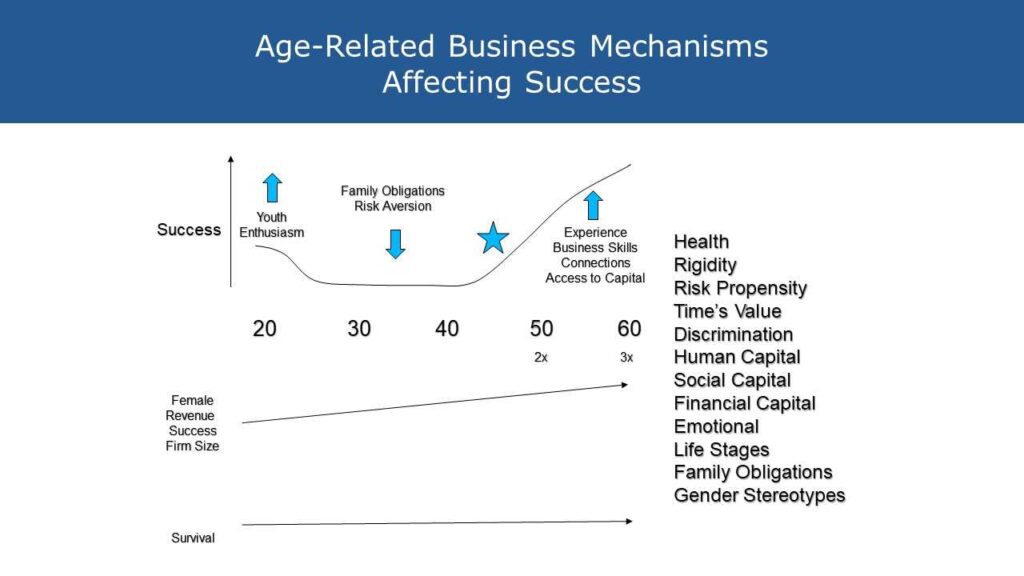Transcript [lightly edited for clearity]
Hey Steve Imke here from SteveBizBlog. Hey, I get a lot of questions from clients that ask me, “When is the best time to start a business?” And I kind of always have to tell them “It’s kind of a complicated thing” but some of it, a lot of it, has to do with your age. So, I kind of put together this quick presentation to talk about it.

Ages are on this axis across the bottom right there 20 30 40 50 60. As you can see there’s kind of a bit of a success that happens in the 20s and then it really kind of spikes after 40 and kind of moves up a little bit. I’d like to explain some of the mechanics that kind of go into that.
So, in the beginning, what we have is a little bit of a spike that occurs in what I’m going to call the 20-somethings. A lot of that is driven by the fact that the younger individuals who are starting businesses tend to probably be more freelance-type businesses, not necessarily employer-based businesses, but they have some of the latest understanding of some of the newest technology that’s out there. Maybe they’ve just come out of college and at this point, they have very high enthusiasm which kind of drives that success rate up.
But you’ll notice that if you move along that continuum there’s a little bit of a lull that occurs in about mid-20s to about mid-40s. There’s a lot of downward pressure that comes from family obligations and as a result of that, many people tend to be kind of risk-averse. You know they’re dealing with a mortgage, raising their children who need a lot of family time, that kind of stuff. So business starts tend to drop quite a bit during that period of time.
But then as you approach what we’ll call the midlife crises, people begin to look at starting businesses and they experience some pretty good success principally because they have some experience, they’re generally have been exposed to an industry for quite some time, they’ve managed to accumulate some business skills having worked in the market for maybe 30 years or so, they have network connections, that kind of stuff. And because they’re probably a little bit older they probably had a chance to save some money over time so they have more access to capital. They probably have some assets that will allow them to get some loans and that kind of stuff.
There actually happens to be a sweet spot that generally occurs around 45 years old. Most of the big tech companies, I know you see things like some of those young guys you know Microsoft’s founder Bill Gates or other ones like Mark Zuckerberg, all those that started a business in college, those kinds of things. But quite frankly those are not necessarily the biggest sweet spots to start a business. Generally, it tends to be around 45.
What we see now is there’s a bit of a doubling and even tripling of success that actually occurs in businesses when they’re founded by somebody in their 50s or 60s. So that old adage that you have to be young to start a business is not necessarily a hundred percent true. While there are some businesses that actually are successful for younger people, the vast majority of the success actually comes when the founders are somewhere in their 50s or 60s and starting a business.
Now there’s a couple other phenomena that actually occur with that. Female-founded businesses generally have more success the later in life that the female founded that particular business. The revenue success, in other words, is how much revenue those businesses actually manage to have. The older the founder is, generally the higher the revenue for those businesses, and that also affects the success principally of those particular businesses. And firm size generally, like I had mentioned, a lot of the firms that are started in 20-somethings tend to be more freelance or small family-owned businesses with generally under a million dollars.
By the time you get into the 50s and 60s, many of those firms are actually much larger. They’re no longer what I’m going to consider micro-businesses that in many cases is a family or family lifestyle businesses that kind of stuff. They’re generally building a larger business and a lot of times there’s reasons for doing that.
But what’s interesting is the survival rate of a business that somebody starts in their 30s or 60s really doesn’t change much through that entire thing.
Really when we talk about success, it is a little bit different than survival. Being a success in terms of monetary success and being able to grow that particular business and these are a couple of the items that affect these most often.
I’d like to zoom in a little bit more on the age-related mechanics of things that affect a person’s success.
So, the first one is obviously health. The individual founder’s health can have a profound difference on the success of a business. I think that’s pretty obvious of how that might affect things.
There’s certainly another factor which we’ll call rigidity. Rigidity in thinking, whether opening to new ideas or whether it’s “That’s what’s worked for me in the past that this is the only way it’s going to work in the future” that kind of stuff. Those things [rigidity] can obviously affect the success of a business as well.
There’s a thing that I’m going to call risk propensity. There are certain individuals who have demonstrated a higher degree of risk and others that tends to be more risk-averse. We generally talk a lot about people who are coming out of the military for example. They’ve already indicated that they are willing to exchange their life for a cause, so you know they [veterans] have a pretty high-risk tolerance. Where somebody else may be at a point in their life, maybe where they’re putting their kids through college or maybe they have young children at home or they’ve maybe got an aging parent at home or something along that. Their potential or propensity for risk is probably a lot lower.
Then there is a person’s time value. Again, are you somebody who’s going to want to spend a lot of time with their family is that a big tug on your time. Do you like to spend time in the outdoors with your family or with friends outside or that kind of thing. That versus somebody who can dedicate 100% of their time toward a new venture those kinds of things. Obviously [how you value your time] affects the success of a business.
Discrimination can also affect a business. In some cases, it might be race or maybe you’re having other things that are in your in the workplace. Maybe is very difficult for you to get a job in a particular market. We do see a lot of people who feel that they’re being discriminated against and who will start their own businesses. We see a high number of businesses started by Black and Latinos that are one of the largest growing cadres of entrepreneurial starts, and a lot of that’s kind of based on discrimination. Generally, in the workforce what happens is people kind of get into entrepreneurship as accidental entrepreneurs.
In some cases, human capital, being all the information that you’ve managed to accumulate throughout your life. Whether that’s industry knowledge or whether that’s other kinds of things like understanding emotional intelligence. Those types of things will affect the success of a particular business.
Then there’s social capital, you know how well are you connected out there. Obviously, somebody who’s been out there for a number of years in the workforce and probably has a LinkedIn profile with hundreds of people in their network is probably better to be able to access some of those resources than somebody who’s maybe not even ever been on LinkedIn or is at the very beginning of their career and the only people they know are people their own age. Maybe they’re younger and they don’t necessarily have those network connections.
Financial capital is another one. Obviously, how much access to capital you have, and what assets that you own outright, unencumbered access for example, that can be used to pledge as collateral for whatever goes [a long way] toward being able to help [a founder’s] success in business. If you have more financial capital- it’s one of the first things I always tell my clients “Your access to capital is number one.” [Financial capital and access to capital] dictate the success of a particular business.
Your emotional state, if you are a very emotional individual [and take everything personal] or whether you have outbursts, those kinds of things, that obviously going to affect the success of a business. Or maybe you’re very calming that kind of stuff. You understand the basic concepts of emotions and how that might affect the success of a business.
And certainly, the life stages [the founder is in] has a lot to do with success. We talked a little bit, principally about the success that happens a lot more often later in life, but it has a lot to do with where you are and who you know. Let’s say how much you’ve accumulated in terms of knowledge, and like we talked about human capital a lot of those other kind of things. So definitely where you are in your life stage will definitely affect [success rates.] Principally what we talked about earlier, your family obligations that’s what really what’s the depressing component part that happens generally when [the founder] in their mid-20s to mid-40s. Those are generally family obligations, but they extend beyond that to helping and assisting elderly people and other relatives that kind of stuff that may factor in there.
And then lastly, we have gender stereotypes. A lot of times we see a lot of businesses generally being started by men because women are discriminated against in the workplace. So, they [women] go out and start their own business for example and then they become highly successful because it’s as an entrepreneur nobody really cares about your gender in many cases. As a matter of fact, sometimes gender can be a very valuable thing. It’d be hard for me to sell women’s fashion for example [and be credible] those types of things. I hope this kind of puts some data behind the big question, when is the best time to start a business. I hope this was beneficial for you. Have a nice day.












